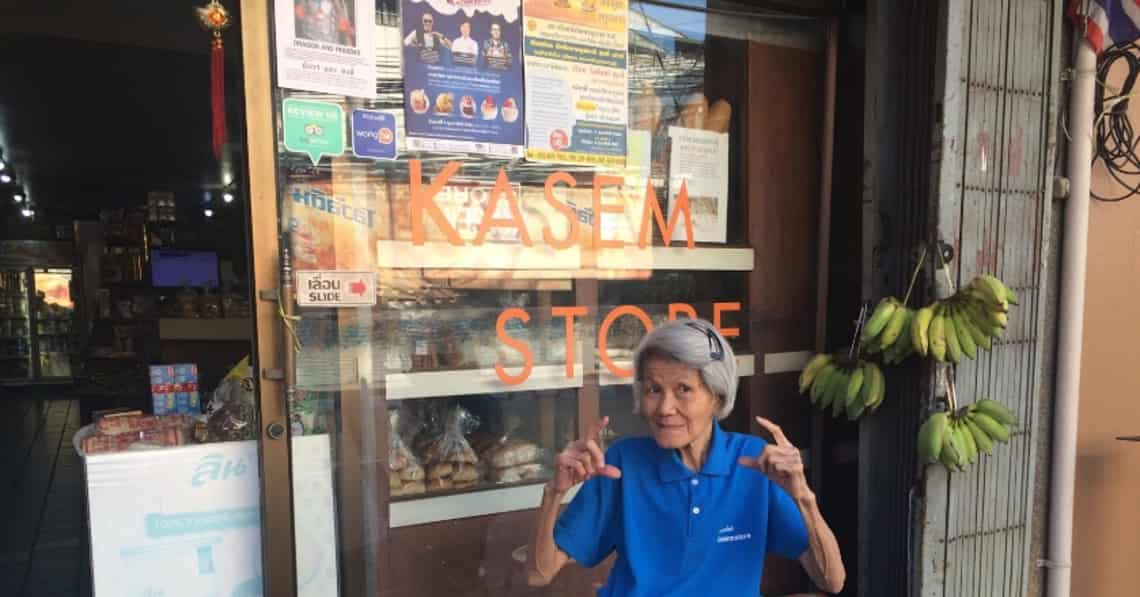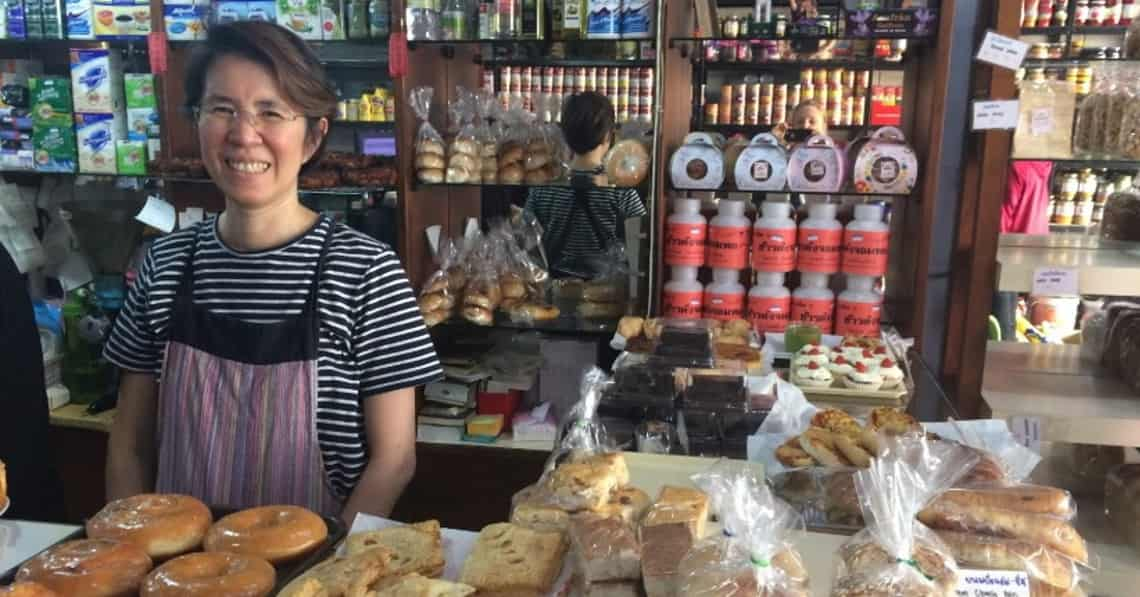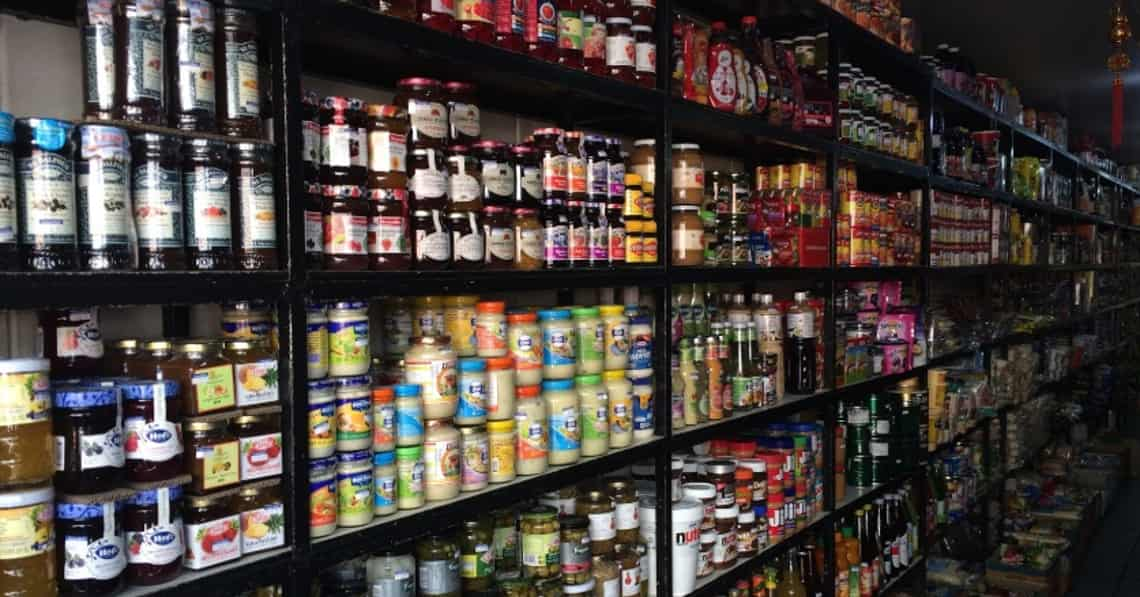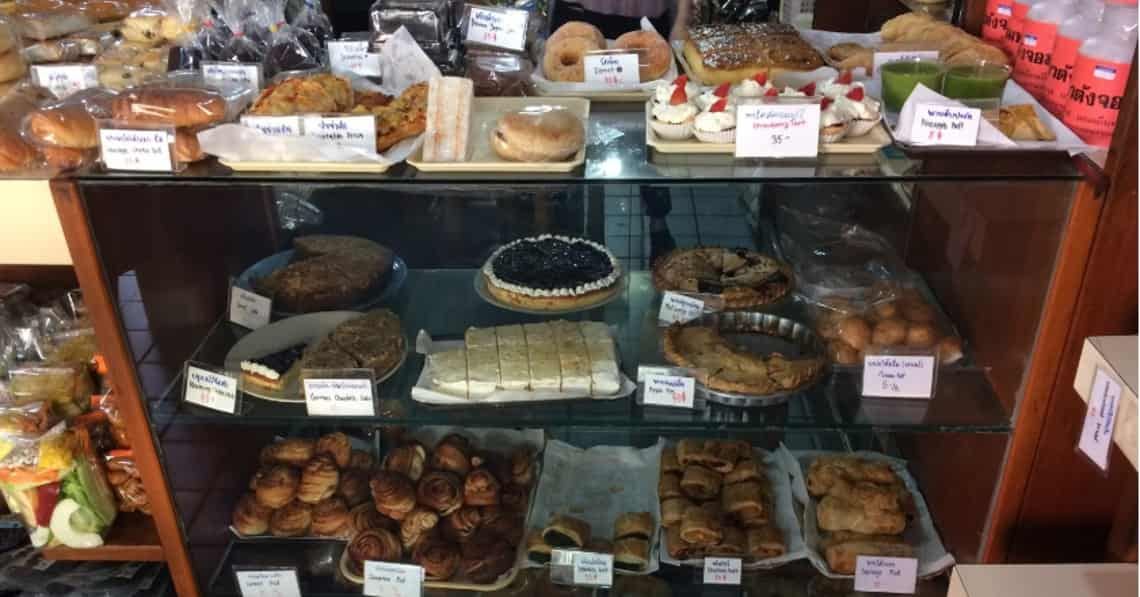Tucked away in one of the many pockets of Chiang Mai’s Chinatown, between a mystery concrete box and a store selling kids’ bikes and pork buns, is a nondescript, seemingly ordinary shop called Kasem Store. Except that Kasem is far from ordinary. This tiny, well-stocked sundries shop on Ratchawong Road is a desert rose, a boutique among run-of-the-mill variety stores that sell everything and nothing. Kasem Store has everything and more. It features delights you won’t find anywhere else in the city––buttery, flaky pastries filled with custard, stewed fruit, rich cheeses, or baked spinach. Baskets stuffed with sticks of crusty baguette. Sticky banana-apple-cashew-nut cake that will change your outlook on life, or rescue you from it. Everything is baked right there, every day, in the small kitchen.
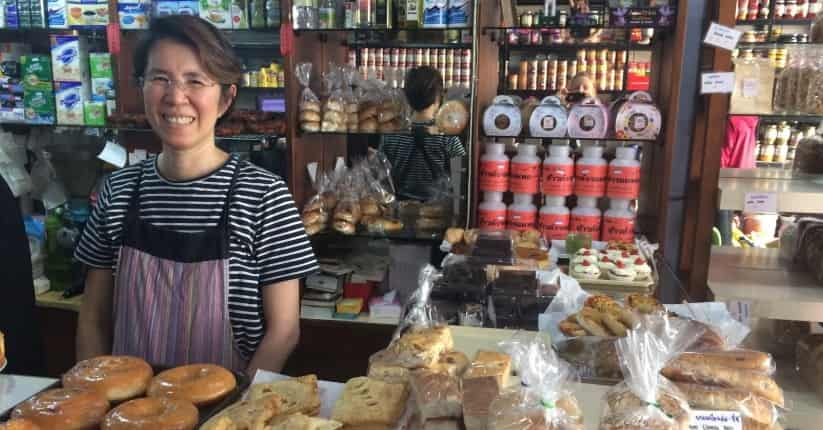
And there’s much more to this shop than homemade savouries and sweets.
Jars of imported pesto, olives, capers, and pickled artichokes are lined up like military men on the shop’s tall shelves. Rows of Indian spices and sauces, and bulging sacks of rice beckon you to switch up the usual pad thai. If you stand the right distance back, you see what you want on every shelf, but the thing you need sits upon the top one, taunting you to reach up and risk knocking over jars of sweet mango jam. Baskets of squash and potatoes from the Royal King’s Project, carrots, and onions so big you need both hands to hold one coax you to dig out your mom’s old stew recipe and spend the afternoon in the kitchen.
It’s the kind of place you wish you’d found the day before you got to Chiang Mai so you’d know exactly where to go once you arrived. In a city where fresh cooked, tantalizing street food is as accessible as the milk in your fridge, you wonder why you’d ever need such a shop. Who really wants to cook in Chiang Mai?
Beyond a sudden desire to cook, Kasem Store ignites something in the visitor. With walls papered in history, you wonder what sat upon these shelves five decades ago when it first opened. You imagine what you might find on the next shelf and the next, what decadent thing will tempt you from behind its glass showcase. Discovering that shop was like that feeling you get when you encounter an unattended $20 bill in the street––your lucky day.
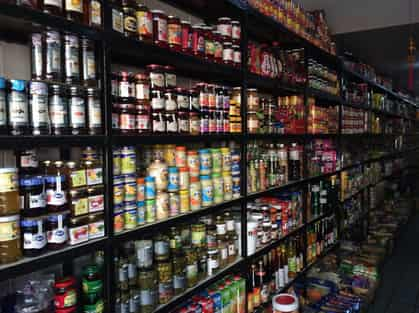
For the past three years, I’ve returned to Chiang Mai to escape the harsh winter of Canada. Each time I come back to the same neighbourhood, not far from the red gate leading to Warorot Market. But it was only this year that I discovered Kasem Store. I encountered it during a walk one day, drawn to the perfect avocados piled in baskets out front, inviting me in. I glanced to my left, through its open door, and spied bread. Not just any 7-11 variety bread, but real wholesome, crusty, seeded, whole grain breads. I walked inside and absorbed its contents with rapture, staring at the edible world upon those selves. How had I not known about this gem for three whole years?
Three-quarters of an hour later, I walked home juggling two swollen bags while I munched a fresh, strawberry tart topped with cream. I stashed my homemade yogurt in the fridge, made a cup of tea to go with my second strawberry tart (yep, that happened), and wondered what was so unique about that shop, besides the obvious. What was that feeling I had there? I decided to let curiosity lead the way and ask if the owner would tell me the story of the Kasem Store.
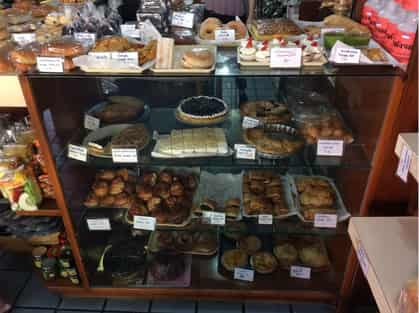
A few days later, tucked away near the back of the shop, I sat with the store’s operator, Air, as she told me all the juicy details about Kasem Shop I knew had been hiding among its shelves.
Kasem was her grandfather who’d opened the shop 50 years ago in Warorot Market, also called Kad Luang, a few years before the fall of Saigon during the war in Vietnam. Following a fire in the market in 1968, Kasem moved his shop to its current location just outside the red gate. When he passed, his daughter and Air’s aunty, Ghee, took over. Now 85 years old and not without spunk, Ghee is in the shop every day, chatting with customers, practicing her English––and French, blowing kisses to people as they walk by, and helping Air and her husband X with daily operations. Ghee, who knows the shop better than a street knows its curb, is the one to ask when you’re on the hunt for something––she pulls strawberry tarts down from the sky.
I asked Air what she loves best about the Kasem Store. “I help my parents’ business. My family supported me to study and graduate so I came back to help them. The money is not a big deal for us, we just stay together. My husband too, he graduated in England and then worked in Bangkok. Then his mother died so he came back to Chiang Mai to take care of his dad because his dad was not good, he was very old. I met him when he stayed in Chiang Mai.” Later, when Air was pregnant with their first daughter, X quit his job to help his wife run the shop and he’s been there ever since.
Air’s loyalty to family reflects her kindness in the community. Just a few days before I sat down with her, I’d made a rush trip to the shop for a loaf of bread (and a token strawberry tart, of course). I hastily rummaged around in my bag for my wallet and found it wasn’t there. Air smiled, handed me the bread and said, “okay, pay me later, don’t worry.” I promised I’d be back later that morning to pay to which she replied, “anytime is okay, today, tomorrow, whenever.”
That was the first time I’d talked to Air, and as I later discovered, her honour system likely grew from gratitude. “We run the business because we have customers like you, many people from all around the world and when they come back every year they come here… we take care of our customers.”
So Air and her family whip up yummies every day to feed the neighbourhood’s farang (foreigners). They take requests for new treats, learn from their customers what to sell, and their patrons respond in kind by delivering them products from around the world. One expat customer, for example, brings them Splenda every year from her home country.
“Many foreigners want us to bake things, some we can, some we can’t because we don’t have the products, but we prove that we can… like one of my customers, last month, he doesn’t eat any white flour and my mom baked for him, no sugar, no white flour.”
As we sat, squatted on plastic stools next to the humming refrigerator, I listened as Air recounted the history of Kasem Store with her warbled voice and twinkly eyes. One question nagged me, so I finally asked her, “where did you learn to make these pies, tarts, strudels, cakes, and waffles?”
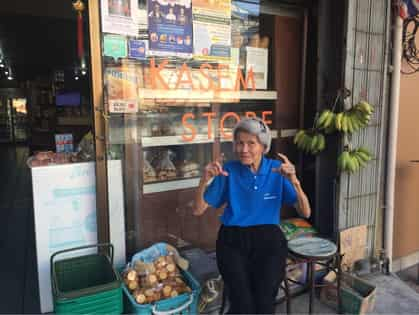
Her answer was the meat of it for me, the chicken in the pot pie, the sausage in the roll, the cream on the top of those strawberry tarts. It satisfied my story hunger better than a book.
“A long time ago, we were the first ones in Chiang Mai because the missionaries from America stayed in Chiang Mai and asked us––asked my aunty, my mother, my father––to teach us to make the bakery, and they asked my grandfather to get the flour from Bangkok.”
American missionaries, probably the few expats residing in Chiang Mai at the time, wanted a taste of home, so they taught Kasem’s family how to order needed ingredients from suppliers and bake a variety of pastries and breads. One of the first Western goods they learned to make was waffles (and they’re good––thankfully, they also sell maple syrup). According to Aunty Ghee, waffles were Kasem Store’s claim to fame.
That was the beginning of the Kasem Store community, of two cultures coming together to learn, teach, bake, eat, and share the goodness of food. Doesn’t food always bring everyone together? Now, a digital roamer perched for a few months in present-day Chiang Mai, I’m eating the same cinnamon raisin rolls that some American missionaries taught this woman’s grandfather to bake fifty years ago. Reason #1053 on a living list of reasons to return here year after year.
Air’s voice lifted when she described how, incidentally, her family ended up cooking for the country’s former King, Bhumibol Adulyadej.
“Maybe 40 years ago when the King came to Chiang Mai and every year that the King came to Chiang Mai, the one who cooks for him came and ordered many things and taught us to make the chicken curry puff and then they ordered some from us.”
Imagine, a tiny, family-owned shop surreptitiously cooking for the country’s beloved King? That could’ve been a brilliant marketing hook to boost business with the locals. But like Air said, Kasem Store isn’t about the money.
Finally, I asked Air how she sees the shop changing over time. She remarked how the market is so competitive now. Convenience stores dot every other storefront and sprawling supermarkets house almost every imported product an expat can dream up, so the future is unknown. Rather than sticking to family tradition, Air gives her daughters the freedom to study and decide what they want to do when they grow up. They’re not committed to the shop.
But what a lot of those other shops and big box stores don’t have is that sense of solidarity, that feeling I had when I first walked into that shop, and the same one I get every time I return to Chiang Mai. It wasn’t salivating taste buds or a hungry belly that drew me in, but the arms of a community. They gently guided me through the shop, alongside the stacks of everything-you-need-in-a-kitchen-pantry, past the shelf where the coveted extra-dark chocolate hides out, to a place where everybody works together not because they have to but because they want to––very much unlike your commercial supermarket.
That is what makes me return to Chiang Mai each year. Hiding out in its mishmash of sois and food stalls, tin-roofed haberdasheries and crumbling walls are the stories that tell one more tiny piece of the city’s fascinating history.
19 Rachawong Road
Open 8am – 8pm (closed Sundays)
Tel. 053 234 986
Facebook: kschiangmai
